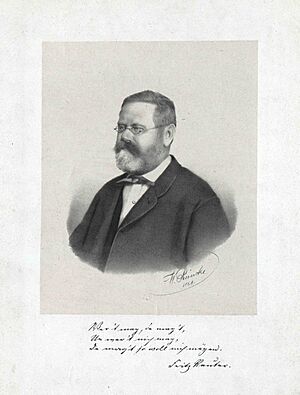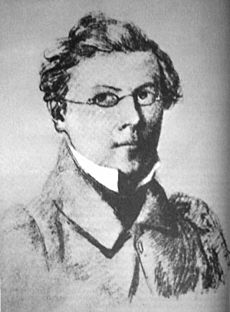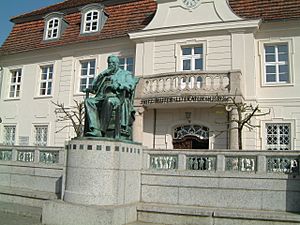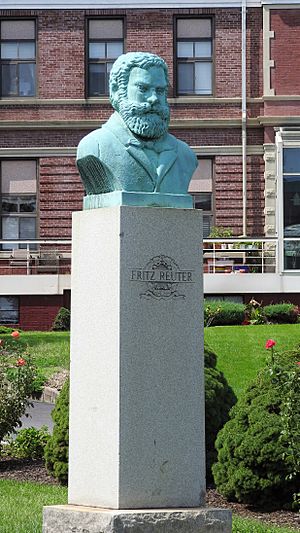Fritz Reuter facts for kids
Fritz Reuter (born Heinrich Ludwig Christian Friedrich Reuter; November 7, 1810 – July 12, 1874) was a famous writer from Northern Germany. He is well-known for his stories and poems written in Low German, a dialect spoken in northern Germany.
Contents
Early Life and Education
Fritz Reuter was born in Stavenhagen, a small town in the Duchy of Mecklenburg-Schwerin. His father was the mayor and also worked as a farmer. Fritz was taught at home by private teachers. Later, he went to high schools (called Gymnasien) in nearby towns like Mecklenburg-Strelitz and Parchim.
Student Days and Challenges
In 1831, Reuter started studying law at the University of Rostock. He joined a student club called Corps Vandalia Rostock. However, he was soon asked to leave because of his behavior and involvement in other student group activities. In 1831, he joined another student club, the Rostock Burschenschaft. He later became friends with Moritz Wiggers.
In 1832, he moved to Jena to continue his studies. There, he joined another student group called the Allgemeine Burschenschaft and its more politically active part, "Germania." Because of his involvement with these student groups, which the government saw as rebellious, he was arrested later that year.
Imprisonment and New Beginnings
In 1833, Reuter was arrested in Berlin by the government of Prussia. He was held in a fortress called Fort Silberberg in Silesia. Even though the only thing they could prove was that he wore the colors of his student club, he was accused of serious disloyalty to the government. He was first sentenced to a very long prison term, but King Frederick William III of Prussia changed this to thirty years in a Prussian fortress, Feste Coburg.
In 1838, the Grand Duke of Mecklenburg helped him, and he was moved to a fortress in his home state, Dömitz. Finally, in 1840, he was set free when a general pardon (called an amnesty) was announced after Frederick William IV became king.
Although he was now 30 years old, Reuter tried to go back to law school at Heidelberg. But his father made him stop because he wasn't focusing on his studies. After returning home, he worked on a farm as a trainee. When his father died in 1845, Reuter found out he wouldn't inherit anything. This meant he couldn't buy his own farm. So, he decided to start writing. At first, he wrote in standard German, but he found more success writing in Low German.
In 1850, he became a private teacher in a small town called Treptow an der Tollense. This allowed him to marry Luise Kuntze, the daughter of a local church leader.
Becoming a Famous Writer
Reuter's first book was a collection of poems and stories in Low German called Läuschen un Riemels (meaning "anecdotes and rhymes"), published in 1853. People really liked it! He released a second collection in 1858. He also wrote Polterabendgedichte (1855) and De Reis' nach Belligen (1855). The last one was a funny poem about some farmers from Mecklenburg who wanted to go to Belgium to learn new farming methods, but they never actually made it there.
In 1856, Reuter moved to Neubrandenburg and decided to become a full-time writer. His next book, Kein Hüsung (1858), was a long poem about the tough parts of village life in Mecklenburg. In 1860, he published Hanne Nüte un de lütte Pudel, which was his last work written in poetry.
In 1861, Reuter became even more popular with Schurr-Murr, a collection of stories. But his most important works were a series of stories called Olle Kamellen ("old stories of bygone days").
The first volume, published in 1860, included Woans ick tau 'ne Fru kam (How I Got a Wife). This is a fun story where Reuter playfully tells how he met and married his wife.
The second volume, Ut de Franzosentid. Ut mine Festungstid (1861), included two parts. Ut de Franzosentid is set in 1813, during the time of the Napoleonic wars, and shows how these big events affected people in his hometown. Ut mine Festungstid is a powerful story about his difficult time in prison. Both of these novels have been translated into English.
Later Works and Legacy
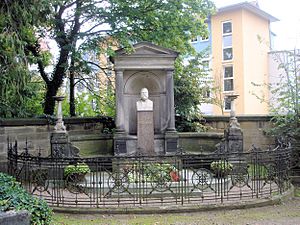
Reuter's most famous work is the novel From My Farming Days (Ut mine Stromtid), which came out in three volumes. In this book, he describes the people he knew in the villages and farms of Mecklenburg. He shows their lives and the situations they faced, including some local events from the revolutionary movement of 1848. This book has also been translated into English.
In 1863, Reuter moved from Neubrandenburg to Eisenach, after receiving an honorary doctorate degree from Rostock University. He passed away there on July 12, 1874.
Reuter's stories might not have complex plots, but they are full of clever moments and great characters. His humor was loved by many in Germany, even though his stories were written in a dialect that could be hard for some to understand.
His collected works, Sämtliche Werke, were first published in 13 volumes between 1863 and 1868. Even after his death, more of his writings were published. People became interested in Reuter's works again after World War II.
Today, several places are dedicated to Fritz Reuter's work, including the Fritz Reuter Gesellschaft e.V. in Neubrandenburg, the Fritz-Reuter-Literaturmuseum in Stavenhagen, and the Reuter-Wagner-Museum in Eisenach. There's also the Fritz Reuter Literary Archive in Berlin, which keeps track of letters written by and to him.
Filmography
- During My Apprenticeship (1919)
- Struggle for the Soil (1925)
- Uncle Bräsig (1936)
- Kein Hüsung (1954)
See also
- Gorch Fock (author)
- Klaus Groth
 | Lonnie Johnson |
 | Granville Woods |
 | Lewis Howard Latimer |
 | James West |


